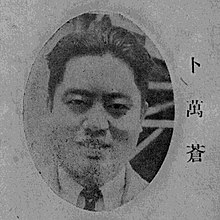Bu Wancang
Bu Wancang , Chinese 卜 萬 蒼 / 卜 万 苍 , Pinyin Bǔ Wàncāng , W.-G. Pu Wan-ts'ang , (* 1903 in Anhui Province , † 1974 ) was a Chinese film director, cameraman and producer. He was one of the leading filmmakers in China from the 1920s to 1940s.
In 1921 he started working as a camera assistant for the China Film Company. He then also worked as a cameraman for the Mingxing film company . He was involved in the commercially successful productions The Sentiment (1924) by Gu Kenfu and Chen Shouyin and The New Family (1925) by Ren Jinping . He made his directorial debut in 1926 with the film Innocence . In 1931 he went to the Lianhua Film Company , where numerous films were made under his direction. Among the most important is a series starring Jin Yan and Ruan Lingyu : Tao hua qi xue ji ( The Peach Girl ), Yi jian mei ( A Spray of Plum Blossoms ) and Lian ai yu yi wu ( Love and Duty ) (all 1931), and Sange modeng nü xing ( Three Modern Women , 1933).
After the Japanese occupation of Shanghai , Bu stayed in town and took part in the production of nationalist costume dramas. He was the director of the Japanese propaganda films Universal Love (1942) and The Opium War (co-director: Ma-Xu Weibang , 1943), which were supposed to help justify Japanese colonialism in China. This work prevented a bus career in post-war China. He went to Hong Kong in 1948 and worked for the Yonghua Film Company for two years. He then founded his own production company Taishan Film Company and shot in Hong Kong until the early 1960s.
Web links
- Bu Wancang in the Internet Movie Database (English)
| personal data | |
|---|---|
| SURNAME | Bu, Wancang |
| BRIEF DESCRIPTION | Chinese film director |
| DATE OF BIRTH | 1903 |
| PLACE OF BIRTH | Anhui Province |
| DATE OF DEATH | 1974 |
